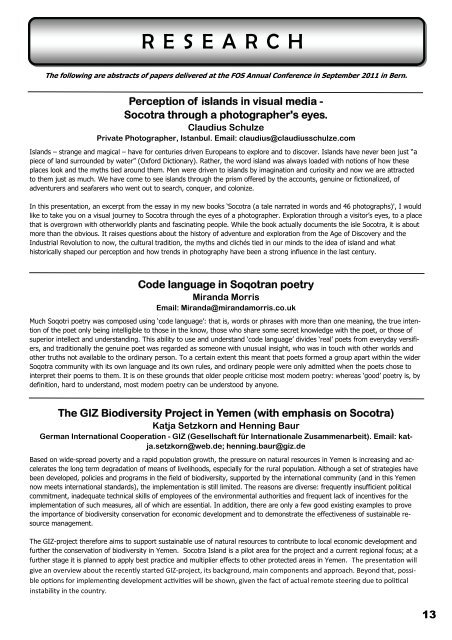TAYF the Soqotra Newsletter - Friends of Soqotra
TAYF the Soqotra Newsletter - Friends of Soqotra
TAYF the Soqotra Newsletter - Friends of Soqotra
Create successful ePaper yourself
Turn your PDF publications into a flip-book with our unique Google optimized e-Paper software.
RESEARCH<br />
The following are abstracts <strong>of</strong> papers delivered at <strong>the</strong> FOS Annual Conference in September 2011 in Bern.<br />
Perception <strong>of</strong> islands in visual media -<br />
Socotra through a photographer's eyes.<br />
Claudius Schulze<br />
Private Photographer, Istanbul. Email: claudius@claudiusschulze.com<br />
Islands – strange and magical – have for centuries driven Europeans to explore and to discover. Islands have never been just “a<br />
piece <strong>of</strong> land surrounded by water” (Oxford Dictionary). Ra<strong>the</strong>r, <strong>the</strong> word island was always loaded with notions <strong>of</strong> how <strong>the</strong>se<br />
places look and <strong>the</strong> myths tied around <strong>the</strong>m. Men were driven to islands by imagination and curiosity and now we are attracted<br />
to <strong>the</strong>m just as much. We have come to see islands through <strong>the</strong> prism <strong>of</strong>fered by <strong>the</strong> accounts, genuine or fictionalized, <strong>of</strong><br />
adventurers and seafarers who went out to search, conquer, and colonize.<br />
In this presentation, an excerpt from <strong>the</strong> essay in my new books ‘Socotra (a tale narrated in words and 46 photographs)', I would<br />
like to take you on a visual journey to Socotra through <strong>the</strong> eyes <strong>of</strong> a photographer. Exploration through a visitor’s eyes, to a place<br />
that is overgrown with o<strong>the</strong>rworldly plants and fascinating people. While <strong>the</strong> book actually documents <strong>the</strong> isle Socotra, it is about<br />
more than <strong>the</strong> obvious. It raises questions about <strong>the</strong> history <strong>of</strong> adventure and exploration from <strong>the</strong> Age <strong>of</strong> Discovery and <strong>the</strong><br />
Industrial Revolution to now, <strong>the</strong> cultural tradition, <strong>the</strong> myths and clichés tied in our minds to <strong>the</strong> idea <strong>of</strong> island and what<br />
historically shaped our perception and how trends in photography have been a strong influence in <strong>the</strong> last century.<br />
Code language in <strong>Soqotra</strong>n poetry<br />
Miranda Morris<br />
Email: Miranda@mirandamorris.co.uk<br />
Much Soqotri poetry was composed using ‘code language’: that is, words or phrases with more than one meaning, <strong>the</strong> true intention<br />
<strong>of</strong> <strong>the</strong> poet only being intelligible to those in <strong>the</strong> know, those who share some secret knowledge with <strong>the</strong> poet, or those <strong>of</strong><br />
superior intellect and understanding. This ability to use and understand ‘code language’ divides ‘real’ poets from everyday versifiers,<br />
and traditionally <strong>the</strong> genuine poet was regarded as someone with unusual insight, who was in touch with o<strong>the</strong>r worlds and<br />
o<strong>the</strong>r truths not available to <strong>the</strong> ordinary person. To a certain extent this meant that poets formed a group apart within <strong>the</strong> wider<br />
<strong>Soqotra</strong> community with its own language and its own rules, and ordinary people were only admitted when <strong>the</strong> poets chose to<br />
interpret <strong>the</strong>ir poems to <strong>the</strong>m. It is on <strong>the</strong>se grounds that older people criticise most modern poetry: whereas ‘good’ poetry is, by<br />
definition, hard to understand, most modern poetry can be understood by anyone.<br />
The GIZ Biodiversity Project in Yemen (with emphasis on Socotra)<br />
Katja Setzkorn and Henning Baur<br />
German International Cooperation - GIZ (Gesellschaft für Internationale Zusammenarbeit). Email: katja.setzkorn@web.de;<br />
henning.baur@giz.de<br />
Based on wide-spread poverty and a rapid population growth, <strong>the</strong> pressure on natural resources in Yemen is increasing and accelerates<br />
<strong>the</strong> long term degradation <strong>of</strong> means <strong>of</strong> livelihoods, especially for <strong>the</strong> rural population. Although a set <strong>of</strong> strategies have<br />
been developed, policies and programs in <strong>the</strong> field <strong>of</strong> biodiversity, supported by <strong>the</strong> international community (and in this Yemen<br />
now meets international standards), <strong>the</strong> implementation is still limited. The reasons are diverse: frequently insufficient political<br />
commitment, inadequate technical skills <strong>of</strong> employees <strong>of</strong> <strong>the</strong> environmental authorities and frequent lack <strong>of</strong> incentives for <strong>the</strong><br />
implementation <strong>of</strong> such measures, all <strong>of</strong> which are essential. In addition, <strong>the</strong>re are only a few good existing examples to prove<br />
<strong>the</strong> importance <strong>of</strong> biodiversity conservation for economic development and to demonstrate <strong>the</strong> effectiveness <strong>of</strong> sustainable resource<br />
management.<br />
The GIZ-project <strong>the</strong>refore aims to support sustainable use <strong>of</strong> natural resources to contribute to local economic development and<br />
fur<strong>the</strong>r <strong>the</strong> conservation <strong>of</strong> biodiversity in Yemen. Socotra Island is a pilot area for <strong>the</strong> project and a current regional focus; at a<br />
fur<strong>the</strong>r stage it is planned to apply best practice and multiplier effects to o<strong>the</strong>r protected areas in Yemen. The presenta�on will<br />
give an overview about <strong>the</strong> recently started GIZ‐project, its background, main components and approach. Beyond that, possi‐<br />
ble op�ons for implemen�ng development ac�vi�es will be shown, given <strong>the</strong> fact <strong>of</strong> actual remote steering due to poli�cal<br />
instability in <strong>the</strong> country.<br />
13


